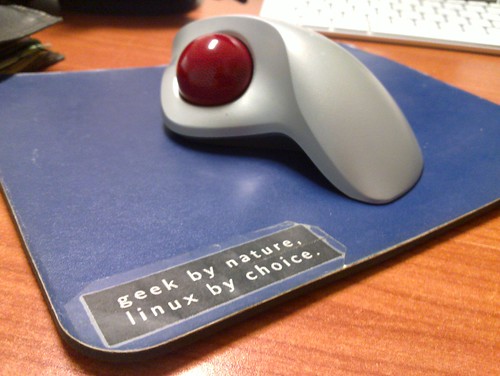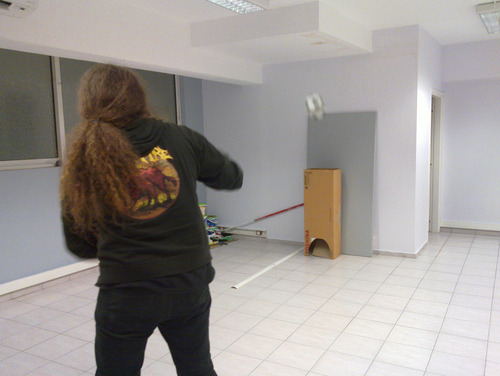mini-posts
- Today’s exploration: Beauty
“In its most profound sense, beauty may engender a salient experience of positive reflection about the meaning of one’s own existence.” [article, video]
- Quote: On Teams
“I enjoy a working environment where the word ‘team’ is uttered in derision, and view the process of team or community as a result of mutual respect and enlightened self interest as opposed to a management method where fuzzy feelings are elicited to get the benefits and delegate the blame.” (comment by dkite on LWN article)
- Skype wows
Calling to Greek landline phones (both in-town and country-wide) is cheaper with Skype than Forthnet. Yay for N900 handling all my local calls then.
- Greetings.
“To the past, or to the future. To an age when thought is free. From the Age of Big Brother, from the Age of the Thought Police, from a dead man… greetings.” (1984)
- Rock Paper Scissors Spock Lizard
“Scissors cuts Paper covers Rock crushes Lizard poisons Spock smashes Scissors decapitates Lizard eats Paper disproves Spock vaporizes Rock crushes Scissors.” (via @mperedim)
-
#l10n Thank You
-
"Thank You" In Over 465 Languages.
-
Quote
You can manage 50 people through the strength of your personality and lack of sleep.
— Mark Pincus, founder and chief executive of Zynga
-
Quote
I suppose it's old partner, but the beat goes on Da da dum da dum da da...
— Eminem
-
Geek by nature, Linux by choice
This weekend @andy_lupo and me will head north to Thessaloniki to present at the FOSS-Communities Conference some of the kewl technologies we're using at Indifex. Andreas' talk is titled "Multi-GB databases with NoSQL" and mine "Extreme Web Programming".
Additionally, I was humbled to be invited from the local entrepreneur's club OpenCoffee to present at their weekend event. I'll talk about open-source business models and the lessons learned while building Indifex. The talk is titled "Transifex: Developing Open Source Software for fun and profit".
So looking forward to this trip. I hope the weather is nice on Friday evening!

-
Quote
An entrepreneur is someone who dares to dream the dreams and is foolish enough to try to make those dreams come true.
-
Making things happen
LWN.net interviewed Leslie Hawthorn, the main person behind Google Summer of Code. I liked how a small team in a big company Google can feel like a startup sometimes.
I think the most important lesson I learned was to just get out there and make things happen, no matter how many mistakes you'll make along the way and no matter how many pairs of eyes are watching you make those mistakes. When I started with the team, I had no FOSS experience whatsoever and was quite worried about doing the wrong thing, and very publicly no less. Over time, I realized the it was far better to make as much progress as possible and make the inevitable course corrections required rather than try to get everything right from the start.
I've also learned that a small group of people who are dedicated to making the world a better place can be incredibly successful in doing just that. It may sound like a cliche, but I never imagined when I started working on Summer of Code that I would have the chance to help so many individuals and projects make things better.
 (pic by CRUSTINA!)
(pic by CRUSTINA!)
-
Quote
Awesome teaching books might as well come with everything underlined by default.
—
-
Do you monetize your international traffic?
Did you know that ~80% of the traffic on Google, Facebook and Twitter come from outside of the US?
Fred Wilson (avc.com) has written an insightful blog post titled "Does Rest Of World Matter More Than The US?". Fred believes that localization is key to monetize outside of the US:
The web sector needs to start working harder on international monetization. [...] Web services that are highly international today should invest in fully localizing their user experience and then start thinking about monetizing outside of the US.
This is the reason d'etre of web services like Transifex: the vast majority of international speakers, who can stay on your website twice as much and have 4x more chances of buying something, if your website speaks their native language.
Of course the US traffic can achieve (much) higher monetization than other countries in most industries, but the monetization does follow the high numbers of international visitors:
Even if international traffic could only be monetized 25% as well as US traffic, when your international traffic is 80% of your total traffic, you would make as much money internationally as domestically. So that's a lot of potential out there to be tapped.
An interesting comment was made by daveclark, mentioning that the cost of winning a local market shouldn't be underestimated. Businesses which 'inherently scale friction-free across markets' should 'game on', while others might need much more work than just localizing the user interface (think, for example, selling shoes or books). Lots of good comments on the article.
-
Quote
Sapere aude! (Dare to Know)
— Horrace
-
Quote
Wimps tend to talk a lot about problems, and brave people tend to talk about challenges.
The belief that there's a solution to something converts it from a problem into a challenge.
— moi
-
Mercurial rebase and merges
Epiphany!
The past days I learned great things today about Mercurial.
-
I found out Joel Spolsky's hginit.com. It teaches you the key concepts behind hg in a way which doesn't mess with complex internals, but focuses on what's important: the user experience.
-
I found out that the latest version of the hgtk history window supports running an 'Outgoing' command, which directly marks the nodes which will be pushed.
-
I noticed that sometimes when I rebase, I get a merged head node instead of a linear history. That is, the rebase doesn't work 100%. Not sure why this was happening, but I found a few hackish workarounds. The funny thing is that I also found a solution: I then rebased the branche's root node on top of the merged node.
I now understand that the problem was much simpler: I just run accidentally hg rebase with
--sourceinstead of--branch. The first flag rebases a single node and the latter a whole branch. So, obviously, only the last node was "rebased" to look on top of tip. Instead, when you rebase with--branch, the branche's base node is rebased, and the history is, of course, linearized.Success.
 (The Beast playing some hoops at the office.)
(The Beast playing some hoops at the office.)-
-
ack
ack rocks. It's like grep, but you can also ignore
.svn-like dirs and backup files (foo~, foo#), specify file types to search, color highlighting. Sweet! Http://betterthangrep.com/








